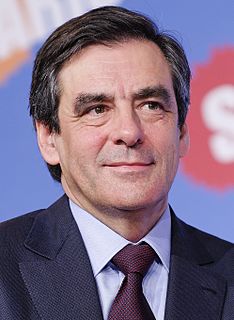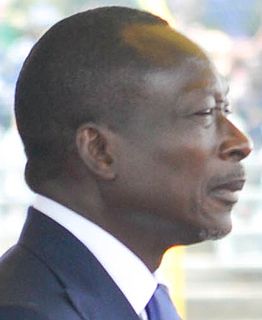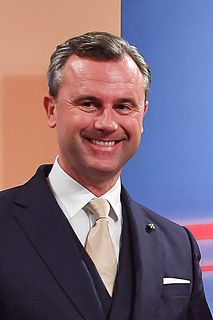
The Politics of Benin take place in the framework of a presidential representative democratic republic, wherein the President of Benin is both head of state and head of government, and of a multi-party system. Executive power is exercised by the government. Legislative power is vested in both the government and the legislature. The Judiciary is independent of the executive and the legislature. The current political system is derived from the 1990 Constitution of Benin and the subsequent transition to democracy in 1991. The Economist Intelligence Unit has rated Benin as "hybrid regime" in 2016.

Presidential elections were held in Croatia in January 2005, the fourth such elections since independence in 1991. They were the first presidential elections held after the constitutional changes of November 2000, which replaced a semi-presidential system with an incomplete parliamentary system, greatly reducing the powers of the President in favor of the Prime Minister and their cabinet. Incumbent president Stjepan Mesić, who had been elected in 2000 as the candidate of the Croatian People's Party, was eligible to seek reelection to a second term and ran as an independent as the constitution prohibits the President from holding party membership while in office.

Elections in Lithuania gives information on elections and election results in Lithuania.

General elections were held in the Central African Republic on March 13, 2005 to elect the President and National Assembly. A second round was held for both elections on May 8, marking the end of the transitional process that began with the seizure of power by François Bozizé in a March 2003 coup, overthrowing President Ange-Félix Patassé. A new constitution was approved in a referendum in December 2004 and took effect the same month.

Ibrahim Boubacar Keïta, or as he is often known, IBK, is a Malian politician who has been President of Mali since 2013. Previously he was Prime Minister of Mali from 1994 to 2000 and President of the National Assembly of Mali from 2002 to 2007. He founded a political party, Rally for Mali (RPM), in 2001. He was elected as President in the July–August 2013 presidential election and sworn in on 4 September 2013.

The French legislative elections took place on 10 June and 17 June 2007 to elect the 13th National Assembly of the Fifth Republic, a few weeks after the French presidential election run-off on 6 May. 7,639 candidates stood for 577 seats, including France's overseas possessions. Early first-round results projected a large majority for President Nicolas Sarkozy's UMP and its allies; however, second-round results showed a closer race and a stronger left. Nevertheless, the right retained its majority from 2002 despite losing some 40 seats to the Socialists.

Presidential elections were held in Benin on 5 March 2006. Long-time president Mathieu Kérékou was barred from running again by a two-term limit and an age limit of 70 years for candidates; in July 2005 he signalled that he would not seek to change the constitution, as has been done in some other African countries, so that he could run again. Kérékou's long-time rival Nicéphore Soglo was also barred from standing due to his age. With both of the men who had been the country's leading political figures for many years unable to contest the election, it had a level of openness and unpredictability that is uncommon to African presidential elections. Since no candidate won a majority, a second round was held between the two leading candidates on 19 March; Yayi Boni won the election and took office in April.

The Ukrainian presidential election of 2010 was Ukraine's fifth presidential election since declaring independence from the Soviet Union in 1991. The first round was held on January 17, 2010. The run-off between Prime Minister Yulia Tymoshenko and opposition leader Viktor Yanukovych followed on February 7, 2010.

The 2007 Turkish presidential election refers to two attempts to elect the country's 11th president, to succeed Ahmet Necdet Sezer. The most likely candidate for president was Abdullah Gül. Turkey's presidential office is regarded as the guardian of the country's secular system; the fact that Gül's wife wears the Islamic headscarf, as well as his own history in political Islam, turned the elections into a political crisis.

Presidential elections were held in Mali on 29 April 2007. Incumbent president Amadou Toumani Touré ran for re-election against seven other candidates and won in the first round with about 71% of the vote.

A parliamentary election was held in Mali on 1 July 2007 and 22 July. In the first round, there were about 1,400 candidates for 147 seats in the National Assembly.

The current Constitution of Madagascar was, according to the national electoral commission, endorsed by a majority of voters in the constitutional referendum held on 14 November 2010. The new constitution launched the Fourth Republic of Madagascar and was widely seen as an attempt to consolidate and legitimise the rule of Andry Rajoelina and his High Transitional Authority government which was installed after a military-backed coup d'état against President Marc Ravalomanana at the beginning of the ongoing national political crisis. One substantive change from the constitution of the Third Republic was to lower the minimum age for presidential candidates from 40 to 35. This made Rajoelina, aged 36 at the time, eligible to stand in presidential elections.

The 2003 Armenian Presidential election took place in Armenia on 19 February and 5 March 2003. No candidate received a majority in the first round of the election with the incumbent President Robert Kocharyan winning slightly under 50% of the vote. Therefore, a second round was held and Kocharyan defeated Stepan Demirchyan with official results showed him winning just over 67% of the vote. However both the opposition and international observers said that the election had seen significant amounts of electoral fraud and the opposition did not recognise the results of the election.

The 2011 Liberian general election was held on 11 October 2011, with a presidential runoff election held on 8 November 2011. The presidency, as well as all seats in the House of Representatives and half of the seats in the Senate, were up for election. The election was overseen by the National Elections Commission (NEC).

The 2011 Portuguese presidential election was held on 23 January 2011. This election resulted in the re-election of Aníbal Cavaco Silva to a second term as President of Portugal. Turnout in this election was very low, where only 46.52% of the electorate cast their ballots. Cavaco Silva won by a landslide winning all 18 districts, both Autonomous regions of Azores and Madeira and 292 municipalities of a total of 308.

General elections were held in Zambia on 11 August 2016 to elect the President and National Assembly. A constitutional referendum was held alongside the elections, with proposals to amend the bill of rights and Article 79.

Presidential elections were held in Benin on 6 March 2016, having been delayed by one week due to logistical constraints. Incumbent President Thomas Boni Yayi was at the end of his second presidential term and was constitutionally barred from running for a third. The elections grabbed the interest of many of the country's top businessmen, resulting in over 30 candidates running for the presidency. A second round was held on 20 March, in which businessman Patrice Talon defeated Prime Minister Lionel Zinsou.

Presidential elections were held in Austria on 24 April 2016, with a second round run-off on 22 May 2016. However, the results of the second round were annulled and a re-vote took place on 4 December 2016.

Norbert Gerwald Hofer is an Austrian politician, a member of the Freedom Party (FPÖ) and since 18 December 2017 the Minister of Transport, Innovation and Technology. He was the Third President of the National Council from 2013 to 2017.

Presidential elections were held in Mali on 29 July 2018. In July 2018, the Constitutional Court approved the nomination of a total of 24 candidates in the election. As no candidate received more than 50% of the vote in the first round, a runoff was held on 12 August 2018 between the top two candidates, incumbent President Ibrahim Boubacar Keïta of the Rally for Mali and Soumaïla Cissé of the Union for the Republic and Democracy. Keïta was subsequently re-elected with 67% of the vote. It was the first time in Malian history that a presidential election was forced into a runoff between incumbent and a challenger.























